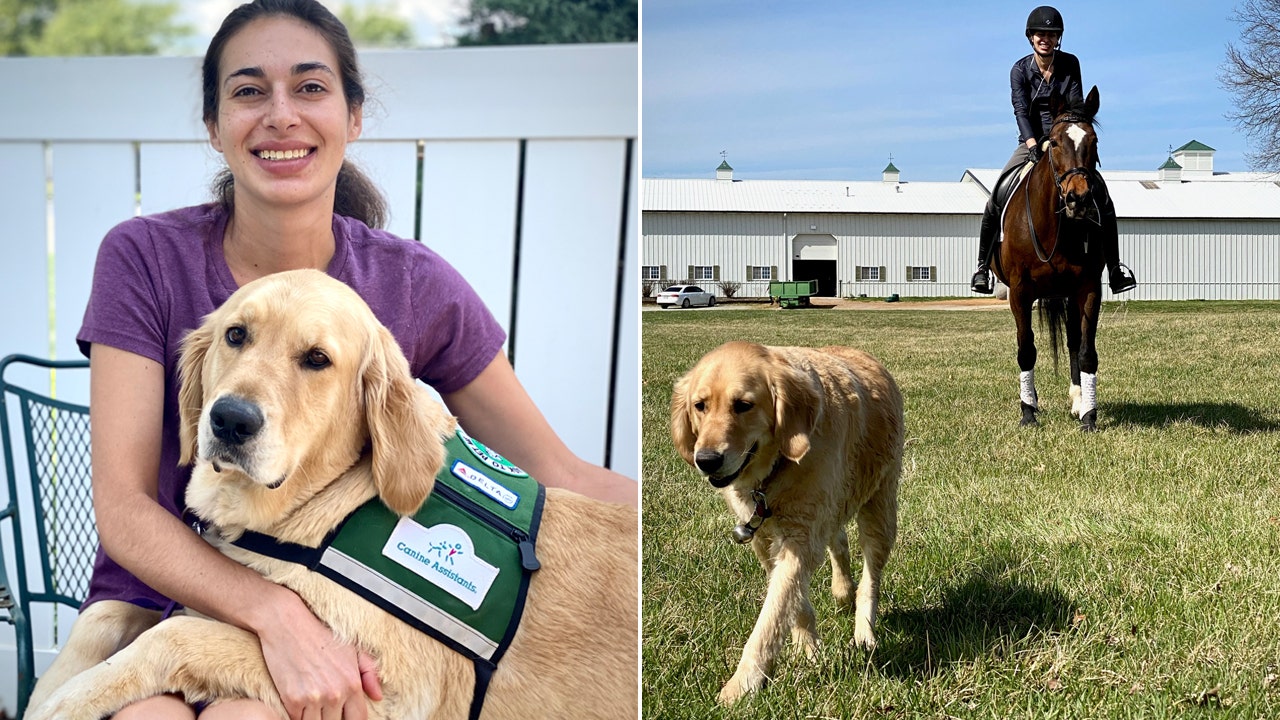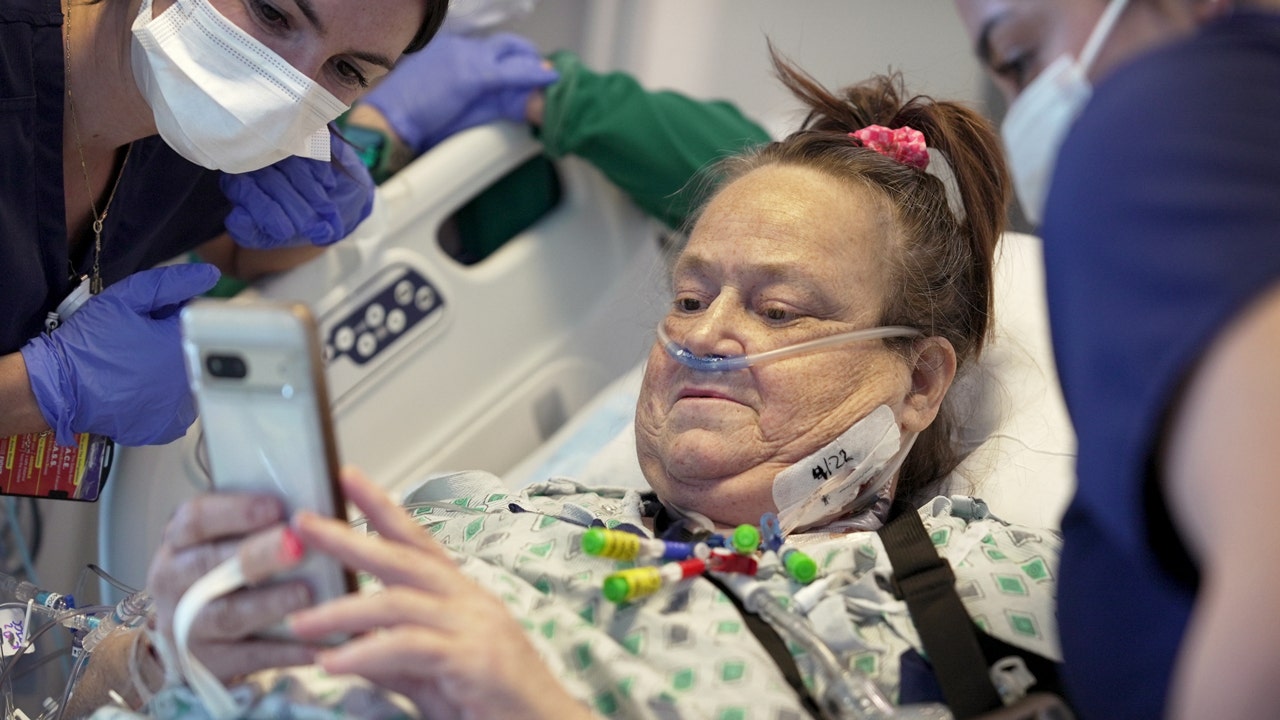For the more than three million people in the U.S. who are living with epilepsy, the uncertainty of the next seizure’s appearance can create dangerous situations.
Now, for many people with the neurological disorder, specially trained service dogs have helped provide safety and peace of mind.
In a recent study published in Neurology, service dogs were found to reduce seizure frequency by 31% while also dramatically improving mental health and quality of life.
VETERANS WITH PTSD GET ‘SIGNIFICANT’ BENEFITS FROM SERVICE DOGS, FIRST NIH-FUNDED STUDY FINDS
Channing Seideman, 30, is one of those patients whose life has been changed by a dedicated service dog.
Born and raised in Aspen, Colorado, Seideman — who now lives in Milford, Ohio — was just 10 years old when she received her epilepsy diagnosis after having two major seizures.

Channing Seideman, pictured with her service dog, Bishop, said he’s given her peace of mind amid her daily epileptic seizures. (Channing Seideman)
“Like any kid, I had big dreams of what I wanted to be when I grew up,” she said in an interview with Fox News Digital.
“I wanted to be a doctor, and I wanted to go to the Olympics and ride horses — and then I got diagnosed and life took a turn.”
LOYAL DOG SAVES CAMPER’S LIFE AFTER RUNNING MILES FOR HELP: ‘NO WORDS’
Dealing with epilepsy during middle school was a struggle, Seideman said.
Having always been a straight-A student, Seideman said she saw her grades plummet to straight Fs.
“Middle school is kind of a blur, to be honest — we were just starting the medication combinations, and my seizures were becoming more and more frequent,” she recalled.
“At the time, I wanted nothing to do with epilepsy, so the idea of having a service dog next to my side wearing a vest that said ‘epilepsy’ … was kind of scary.”
High school was also a challenge, she said.
“Finding my place was difficult. So I really leaned hard on sports, horseback riding in particular, and animals.”
New best friend
Given Seideman’s love of animals, her parents thought she might be interested in a service dog — but at age 15, she was hesitant at first.
“At the time, I wanted nothing to do with epilepsy, so the idea of having a service dog next to my side wearing a vest that said ‘epilepsy’ — making this disease visible — was kind of scary for me.”

Bishop, pictured here with his owner, is Seideman’s second service dog. “It was smooth sailing,” she said of the process. (Channing Seideman)
Her parents convinced her to put her name on the list, since there was a long wait time.
In Nov. 2010, Seideman was selected for a service dog.
The family traveled to Canine Assistants in Alpharetta, Georgia, to take part in a training “boot camp” with Seideman’s first service dog, Georgie.
Canine Assistants places service dogs with people who have a variety of conditions, primarily epilepsy.
“Nobody cares about the epilepsy. They just really like my dog.”
Thanks to a long-running partnership with UCB — a Belgian biopharmaceutical company committed to helping those living with epilepsy and rare seizure disorders — Canine Assistants is able to place dogs at no cost to the patients.
“Two weeks later, Georgie was on the flight home with us, and a couple of days later, she was at school with me,” Seideman said.
DOG RESCUED AFTER BEING CHASED OFF ‘STEEP CLIFFSIDE’ BY RACCOONS: VIDEO
“I was wondering, ‘Is this going to make this disease more visible, or is it going to be a life-saver?’ And it turned out to be a life-saver.”
Seideman’s fears of the disease being magnified were unfounded.
“It became, ‘Channing who?’” she joked. “Now it was all about this cute and amazing dog.”
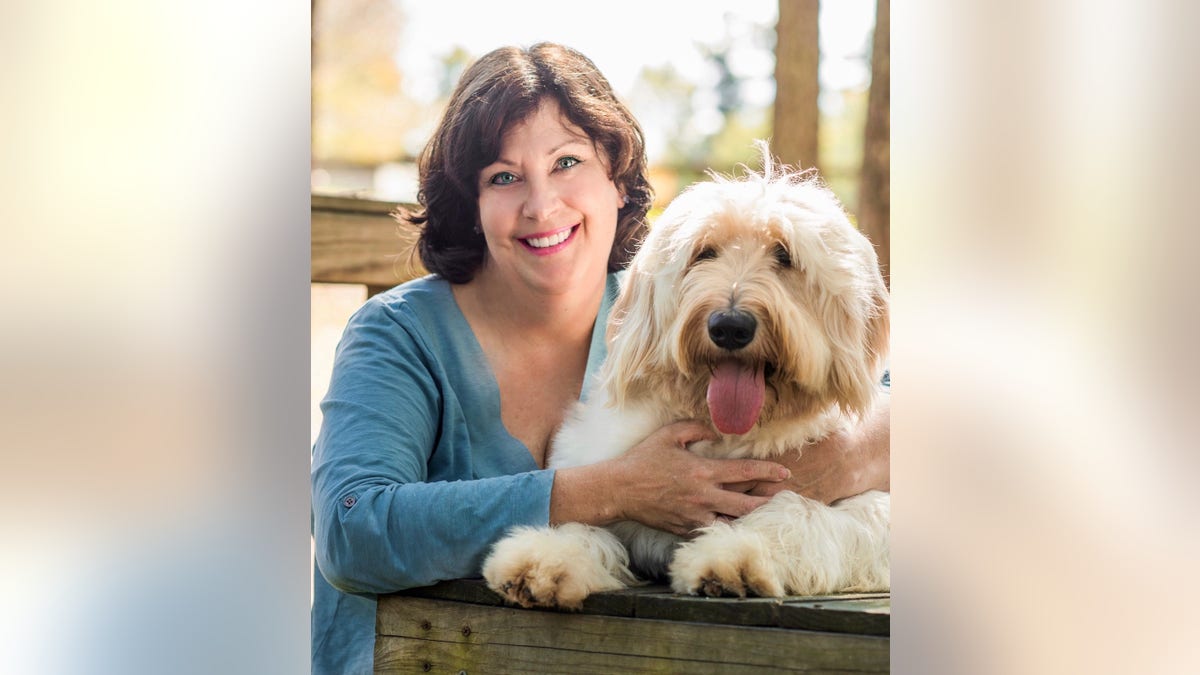
Jennifer Arnold, founder of Canine Assistants in Georgia, has been pairing patients with service dogs for 32 years. She said earlier is better: “There’s really no reason to wait.” (Canine Assistants)
Jennifer Arnold, the founder of Canine Assistants in Georgia, said there is often a hesitation among young people to get a service dog, as “nobody really wants to stand out.”
Said Arnold, “You just want to fit in, and it feels like the dog’s going to make you not fit in.”
She has been working with service dogs for over 30 years, she told Fox News Digital.
SHOCKING MOMENT CAUGHT ON VIDEO: DOG OWNER HELPS CHOKING PET AS DOCTOR GIVES HEIMLICH TIPS
“But as Channing said, ‘Nobody cares about the epilepsy. They just really like my dog.’ The attention that she was getting was completely positive.”
When it comes to introducing service dogs to their owners, Arnold said, earlier is better.
“There’s really no reason to wait,” she said.

“Bishop goes absolutely everywhere with me,” said Seideman, pictured here with her current service dog. When he needs to, he alerts her by placing his paws on her and looking intently at her face, she said. (Channing Seideman)
The dog’s mere presence changes the dynamics in a family for the better, according to Arnold.
Even so, the sensing of oncoming seizures and alerting an owner is the most important part of the service dog’s job.
Service dogs were found to reduce seizure frequency by 31% in a recent study.
“Some dogs wake up at night and check on their people while they sleep,” Arnold said.
“They get nervous — they just want to be sure their owner is OK.”
Having a service dog also lowers the owner’s stress level, Arnold noted.
MISSING DOG IN VIRGINIA CAPTURED AFTER 6 MONTHS ON THE RUN: ‘ALMOST LOST HOPE’
“This results in a significant reduction in the number of seizures that patients have, because stress is a trigger,” she said.
“So just having the dog with you reduces the number of seizures you have, which is pretty magical in itself.”
The dog can also help by protecting its owner during a seizure if it occurs in public, and going to find help if needed.
‘The dogs pick the people’
The team at Canine Assistants is skilled at determining which dog will likely do well with which person, Arnold said.
“But the bottom line is, people think they’re going to get to pick their dog, but it’s the exact opposite,” she said.
“The dogs pick the people.”
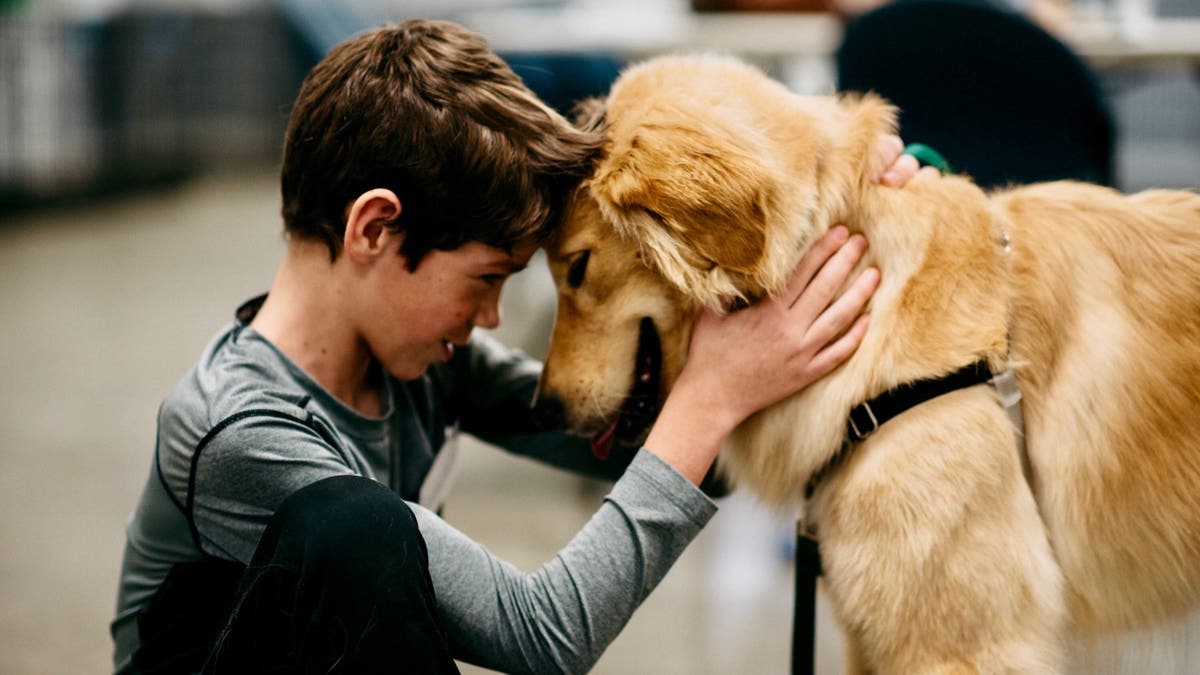
“People think they’re going to get to pick their dog, but it’s the exact opposite,” said Jennifer Arnold, the founder of Canine Assistants in Georgia. (Canine Assistants)
In a typical scenario, Arnold said, Canine Assistants may have four dogs in a camp that have the skills needed for a particular individual.
“The first three might greet the person politely, but the fourth dog might run in, like, ‘Where have you been? I’ve been waiting for you for so long,’” Arnold said.
“That’s what we call ‘a tab A in a slot B,’” she said. “You see it and it’s just done.”
‘GENTLE GIANT’ DOG, AT 250 POUNDS, EATS AN ENTIRE CHICKEN DAILY AS OWNER SPENDS NEARLY $5K A YEAR ON FOOD
After Seideman’s first dog passed away, there was a nine-month period before she was matched with another dog.
During that time, she said, she and her parents realized how much they’d come to rely on Georgie.
“My parents were back to feeling panicked, listening for the ‘thud alert,’” she said. “If they heard a thud upstairs, they would worry it was me falling.”
Seideman, added, “They didn’t realize how much that extra set of ears, extra set of paws, had been doing.”

“In addition to bringing peace of mind, the dogs make epilepsy approachable to the public,” said Seideman, pictured with her service dog, Bishop. (Channing Seideman)
It was a big relief when Seideman was placed with her current dog, Bishop.
“It was pretty much smooth sailing,” she said. “Now, Bishop goes absolutely everywhere with me. Our bond is set in stone.”
To anyone considering getting a service dog, Seideman said she highly recommends it.
WOMAN DISCOVERS HER DOG IS ALIVE AND UP FOR ADOPTION AFTER ‘PUTTING HIM DOWN’
“In addition to bringing peace of mind, the dogs make epilepsy approachable to the public,” she said.
Epilepsy tends to carry a stigma, Seideman said — which is rooted in fear and misunderstandings.
“For example, one of the myths is that there’s only one type of seizure — the big, scary kind where you go unconscious, turn blue, convulse and foam at the mouth,” she said.
“In addition to bringing peace of mind, the dogs make epilepsy approachable to the public.”
Another myth, Arnold added, is that people should put something between the teeth of the person having a seizure to prevent them from swallowing their tongue.
“It is a very bad thing to do,” she warned — and it “could have significantly damaging consequences.”
Having the dog with the person helps to provide a sense of comfort, Seideman said — “something that people can ask questions about, something they can approach. It makes the public comfortable.”
‘He lets me know’
These days, Seideman said she continues to have seizures daily.
Although she has had about 60-70 of the more major episodes — known as tonic-clonic seizures — since her diagnosis, most of them are smaller.
“I have seizures where I may kind of space out and daydream, which is an absence seizure,” she said.
SERVICE DOG BY HER SIDE, TEXAS TEEN WINS MISS DALLAS PAGEANT DESPITE EPILEPSY, AUTISM
“I also have seizures where I may have a jerk in the face, a mild clonic jerk, which can be scary if I’m crossing a street.”
That’s where Bishop comes into play, she said, as he senses what’s happening and stops her from crossing into the street.
“Some people get warnings before a seizure, like an aura,” Seideman said. “I don’t get that warning. I get Bishop. He lets me know.”
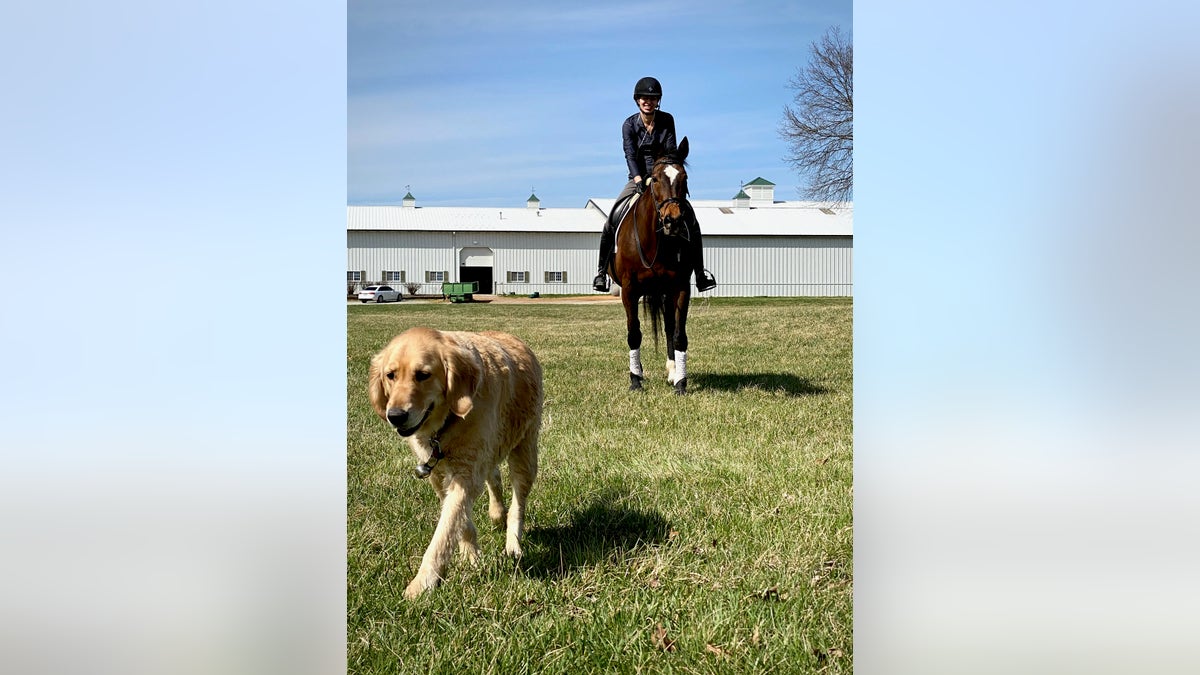
Seideman, who lives on a farm in Ohio, enjoys riding horses as her service dog monitors her and helps keep her safe. (Channing Seideman )
On the family’s 100-acre farm, while Seideman is caring for her horses, Bishop may suddenly come running to check on her, seeming to sense that something is amiss.
“He has this instinct, and will stop whatever he is doing to check on me.”
Bishop alerts Seideman by jumping up and placing his paws on her — “It’s almost like he’s standing, so we’re face to face.”
CLICK HERE TO GET THE FOX NEWS APP
“It’s as if he’s saying, ‘Something’s going on. Pay attention to me.’”
She said, “I may not be having any seizures that I know about, but I could be having subclinical seizures that are only detected by a machine. So I always take Bishop’s word, because Bishop knows — he doesn’t make mistakes.”
Although the wait list for service dogs is long, Arnold of Canine Assistants encourages people to apply.
“He has this instinct, and will stop whatever he is doing to check on me.”
“It’s not just first come, first serve,” she said. “Every applicant is evaluated based on how much the dog can do physically, socially, emotionally and medically, and how appropriate the placement is for the dog.”
She added, “Those factors are equally weighted with how much the dog can do to help.”
CLICK HERE TO SIGN UP FOR OUR HEALTH NEWSLETTER
Canine Assistants has also started testing a new in-home education program, called Handle With Care, that helps people raise and train their own service dogs.
“We’ve cracked the code and we know how to do this, so it’s crazy for people not to have the help they need.”
“The need is just tremendous,” Arnold emphasized. “And I can’t imagine being a mother whose child needs a dog but isn’t able to get one.”
The best part of Arnold’s job, she said, is when she gets to call a family and tell them they’ve been selected.
For more Health articles, visit www.foxnews/health
“As soon as the people answer, I start crying because I’m so excited for them,” she said.
“Those are wonderful calls to make, and I wish we could make a lot more of them.”
